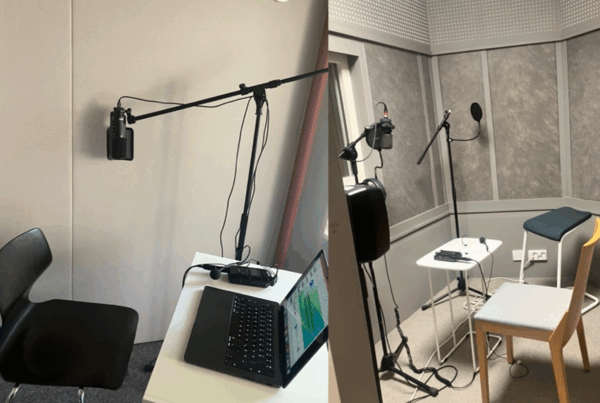
Professor Peter Siemund, Hamburg University, during his guest lecture at Macquarie University
It is easy to assume that bilinguals are better at adding another language to their repertoire. But is that always true?
Evidence from English language learning in multilingual classrooms in Europe
School children in European countries such as Germany all study English as a foreign language as part of their education. Most of these school children will be monolingual in German but an increasing number speaks a language other than German at home. How do these students’ monolingual repertoires in German or bilingual repertoires in German and another language affect their learning of English?
This is the question explored by Professor Peter Siemund from Hamburg University in his lecture in the Lectures in Linguistic Diversity series at Macquarie University.
Professor Siemund started out by identifying a paradox of multilingualism research: multilingualism is often thought to be an advantage for both cognitive development and learning, but, at the same time, cross-linguistic influence research shows that speaking more languages often leads to more negative interference in the learning of subsequent languages.
For instance, he cited research (Lorenz, 2018) that found that Turkish and Russian monolingual learners of English were able to get the meaning of the English progressive aspect right 100% of the time. In contrast, German-Turkish and German-Russian bilinguals only got it right about as frequently as monolingual German speakers. It seems obvious that transfer from German, which has no progressive aspect, negatively affected the English language learning of these bilinguals. So in this case, bilingualism did not help but hinder when it came to this particular grammatical feature of English language learning.
Different languages, different findings
In another study described by Professor Siemund the relationship between reading comprehension scores in German and another language on the one hand and test scores in English on the other were examined. It was found that German comprehension skills correlated with English test performance for German-Russian bilinguals but not for German-Turkish bilinguals. This highlights the fact that bilingualism is not a unitary phenomenon and is different depending on which languages are involved.

The trade-off between linguistic accuracy and fluency (Source: Peter Siemund)
Accuracy versus flexibility
It is not only bilingualism that is not a unitary phenomenon but the same is true of language learning. What do we mean when we say that someone is a good language learner?
One relevant dimension is linguistic accuracy; another is linguistic fluency. In my own experience as a language learner and teacher, learners who are more accurate are often less fluent, while those who are more fluent often sacrifice accuracy.
This was also the conclusion reached by Professor Siemund, who argued that there is a trade-off between accuracy and flexibility. While monolinguals might be more accurate, plurilinguals might be more flexible. He closed by suggesting that bi-and trilingualism might be equilibrious points where accuracy and flexibility are most likely to be in balance.
What do these findings mean for advocacy?
For those of us who are interested in advocating for the rights of migrant language speakers, it can be tricky to talk about the disadvantages of being bilingual or multilingual. It is a balancing act between supporting linguistic diversity and fighting against the discrimination experienced by speakers of minority languages. Supporting linguistic diversity in the abstract sometimes overshadows the fact that some kinds of bi/multilingualism are clearly more equal than others. In fact we already know that being multilingual can be disadvantageous in education and at work, whether it’s for minority language-speaking children who are unable to access education in their first language and standardised tests which discriminate against them or migrants whose linguistic repertoires are problematized in the workplace.
 Maybe we need to reframe the question: instead of asking what the advantages or disadvantages of bi- and multilingualism might be, we should ask how we can help ensure equality of opportunity regardless of linguistic repertoire, as Ingrid Piller does in her recent book Linguistic Diversity and Social Justice.
Maybe we need to reframe the question: instead of asking what the advantages or disadvantages of bi- and multilingualism might be, we should ask how we can help ensure equality of opportunity regardless of linguistic repertoire, as Ingrid Piller does in her recent book Linguistic Diversity and Social Justice.
 References
References
Lorenz, E. (2018). “One day a father and his son going fishing on the Lake”: A study on the use of the progressive aspect of monolingual and bilingual learners of English. In Bonnet, A. and P. Siemund (eds.) Foreign Languages in Multilingual Classrooms (pp. 331–357). Amsterdam: Benjamins.
Piller, I. (2016). Linguistic diversity and social justice: an introduction to applied sociolinguistics. Oxford and New York: Oxford University Press.






 This work is licensed under a
This work is licensed under a
The blog post is interesting because I am bilingual. It made me ponder on how bilinguals are better at language learning. The author of the post made several points, one of which is that there are real advantages and disadvantages. The last statement struck me the most as it mentions focusing on ensuring the quality of opportunity regardless of the linguistic repertoire. I think that is important because no matter what your background of language is, you must have equal opportunities with other people. At the end of the day, language is used to communicate and to be able to express our thoughts freely.
I’d bet actual money, if I had any, that that was because these children were taught in German, so it occurred neither to them nor to their teachers to compare the English progressive aspect to anything in Turkish or Russian.
Maybe it would have been enough if teachers said “most languages, actually, have such a thing”. But of course most people who teach English in German have no idea of comparative typology.
Thank you for this good summary, Hannah. Professor Siemund’s lecture is indeed enlightening. It examined particular dimension of language learning from different types of bilinguals/multilinguals and explores ‘bi-/multi-lingualism’ from a more objective linguistic perspective. Particularly enjoy the point of “trade-off between accuracy and flexibility” as “monolinguals might be more accurate, plurilinguals might be more flexible”. But I can not quite understand your point of “accuracy versus fluency”. Why accuracy and fluency can not co-exist even in a monolingual?
However, if we are talking about school based language learning, social and material contexts also affect schooling outcomes across the curriculum. So bilingual Turkish German children may be from migrant worker families who lack social and cultural capital and the research here is conflating bilingualism with social and economic disadvantage.
In addition, Russian and German and English are all Indo-European languages, Turkish is not. That should be taken into account. Several other factors too, as Miriam mentions. Tove